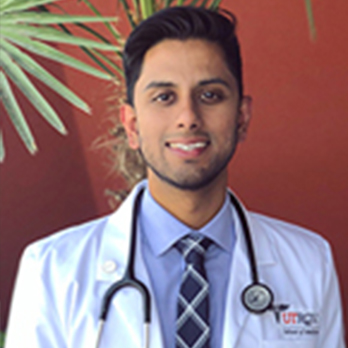Areeb Masood
Medical Student Spotlight
Name: Areeb Masood
Hometown: Austin, TX
Year in Medical School: MS1
Undergraduate School: The University of Texas at Austin
Areeb Masood, a first-year medical student from Austin, Texas, is the academic chair for the Class of 2022 and was recently elected as student body president for the UTRGV School of Medicine. Masood’s research interests include food insecurity and the social determinants of health that contribute to food insecurity. He, along with other first-year medical students, are involved in a student-led research project focusing on food insecurity among pediatric patients in the Rio Grande Valley.
Do you serve on any student interest groups/organizations/activities? If so, which one(s)?
I am currently the Academic Chair for the Class of 2022. I was recently elected to be the incoming Student Body President for the School of Medicine.
What inspired you to become a doctor? When did you know you wanted to be a doctor?
My interest in becoming a doctor was always shaped by my dad’s journey through medicine. I watched him pivot from his career in general surgery in the United Kingdom to internal medicine in the United States. As a young kid, I have memories of him grinding through residency at Brackenridge Hospital. There were days my siblings and I would wake up and go to sleep without seeing him. But I also have extremely fond memories of him being truly satisfied and humbled from the impact he made on patients. He seamlessly carried the lessons of care and respect from the hospital to the community around him. He taught me to help others and value every individual’s unique struggles and contributions to society. Witnessing this honest, unpackaged view of medicine ignited my passion for being a doctor at an early age. As I progressed through my academic career, I really enjoyed scientific problem solving and teaching, and I came to realize that medicine offered me an outlet for this passion. Community service experiences like Camp Kesem (a summer camp for children whose parents were diagnosed with cancer) and my mom’s cancer diagnosis gave me a newfound perspective on the hope that medical care provides for patients and their families. These reasons inspired me to become a doctor.
Why did you choose UTRGV School of Medicine?
Growing up in a close-knit Pakistani immigrant family, the idea of community has always meant a lot to me. There’s an indescribable feeling about having people in your corner, whether that’s friends, family, or mentors, who are willing to support and advocate for you during life’s toughest times. During my interview at UTRGV SOM, I felt that sense of community, and it was a big reason why I ultimately chose to pursue my medical education here. Additionally, I was really interested by the school’s proximity to US-Mexico border. Throughout the application process, I learned more about the colonias of South Texas. These communities are microcosms of America’s transitional ethnic climate, and their growing populations face a unique host of medical problems due to lack of sanitation and access to affordable health care. By choosing UTRGV SOM, I knew I had a unique opportunity to not only learn more about health issues affecting these communities, but also to directly impact them through constructive medical research and community service.
What specialties of medicine interest you the most? Why?
I am currently interested in specialties like radiology, hematology/oncology, surgical oncology, and general internal medicine. From the limited exposure that I’ve had to specialties. I’m drawn to fields that incorporate spatial reasoning, critical thinking, and procedures.
What areas of research interest you the most? Why?
One area of research that is particularly interesting to me right now is food insecurity and the social determinants of health that contribute to food insecurity. I am currently working on a student-led research project with fellow MS1s that specifically focuses on food insecurity among pediatric patients in the Rio Grande Valley. This project really interests me because the pediatric population of the Rio Grande Valley is disproportionately affected by the consequences of food insecurity - due to a multitude of reasons such as higher rates of uninsured families and lack of accessible healthcare infrastructure. My team hopes to study various aspects of food insecurity, and ultimately create sustainable solutions in provider care and resource accessibility to combat the growing issue.
How has the UTRGV School of Medicine fostered your interests in pursuing a career in medicine?
I’ve always been interested in medical academia and, more specifically, teaching medical students/residents in the future. I love the idea of being able to take a complicated concept and synthesizing it. Our curriculum really focuses on collaborative learning through Problem Based Learning, where we work through a patient case with our designated groups. The back-and-forth process of talking through medical pathophysiology really helps me figure out ways that I can improve both as a learner and teacher.
What are your plans for engaging in research this summer?
This coming summer, I plan on performing research at McGovern Medical School in the Department of Diagnostic and Interventional Imaging. More specifically, I will focus on musculoskeletal radiology in relation to sports trauma and pathology. I am also currently working under the mentorship of a breast and body imaging physician at MD Anderson. This research project centers around multimodality imaging of stromal fibrosis of the breast. I will continue this project into the early part of the summer. In addition to these projects, I will continue my student-led research project about food insecurity.
What is one interesting fact others might not know about you that you are willing to share?
GoPro featured one of my photographs on their website and social media.
